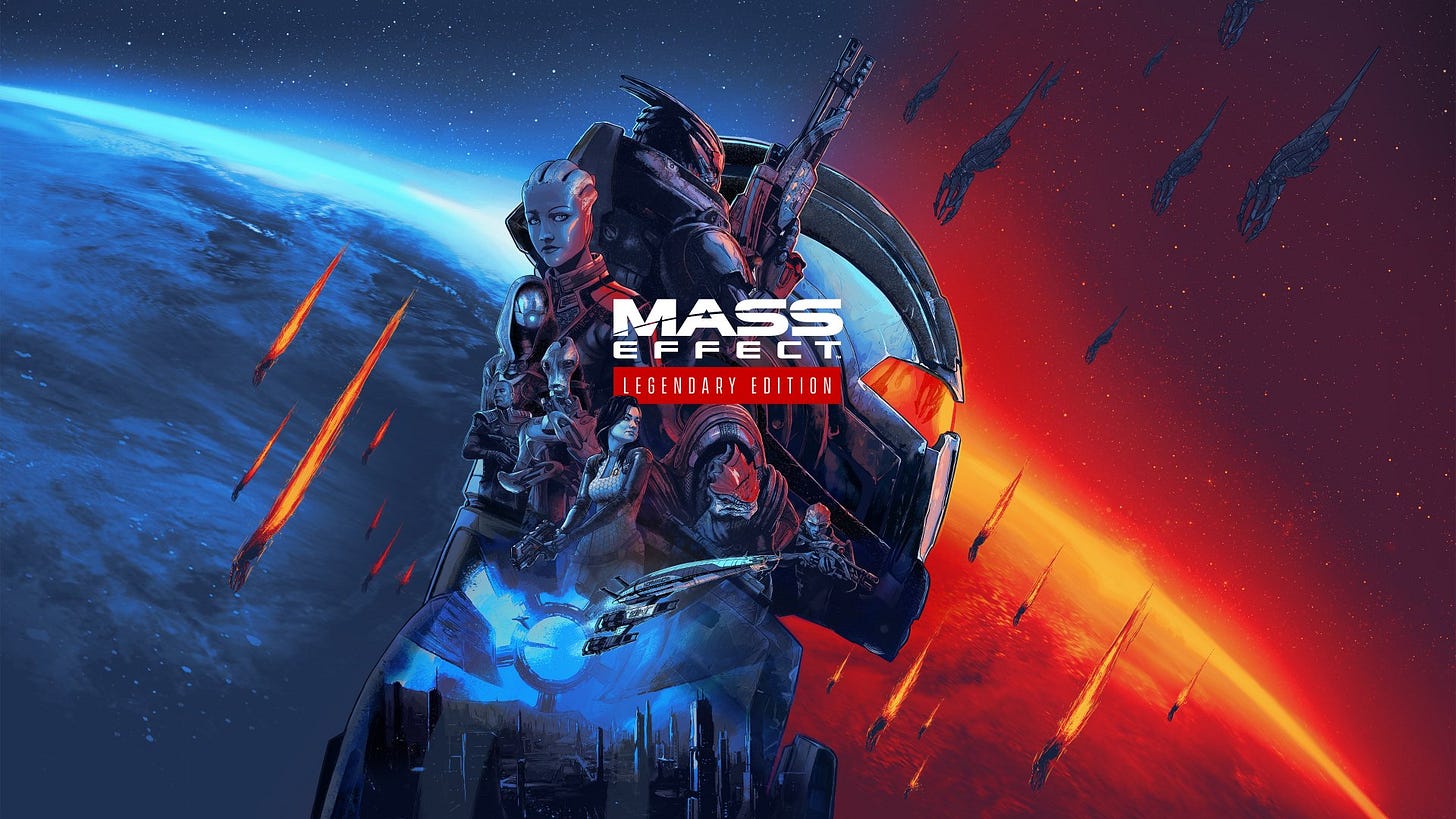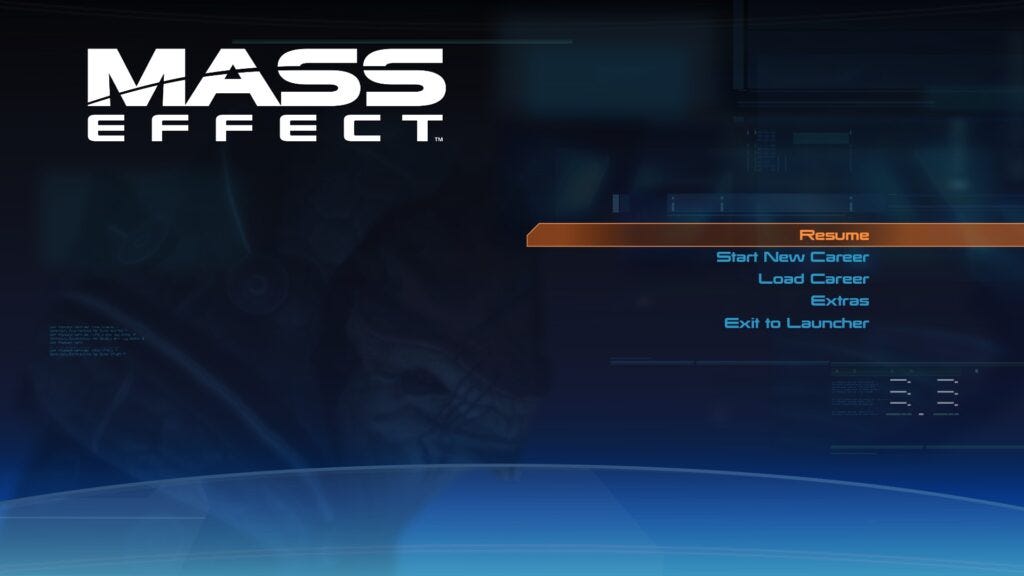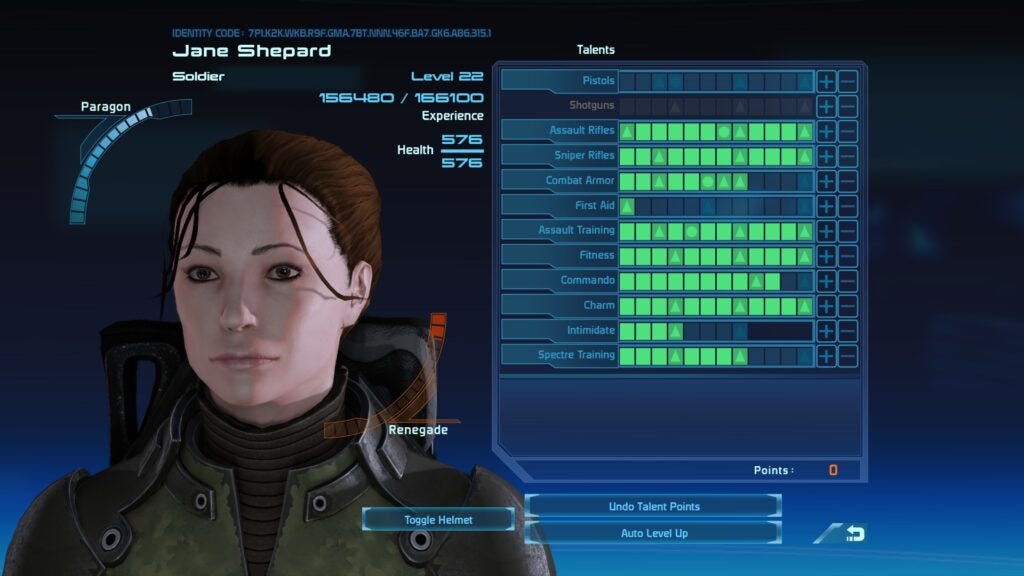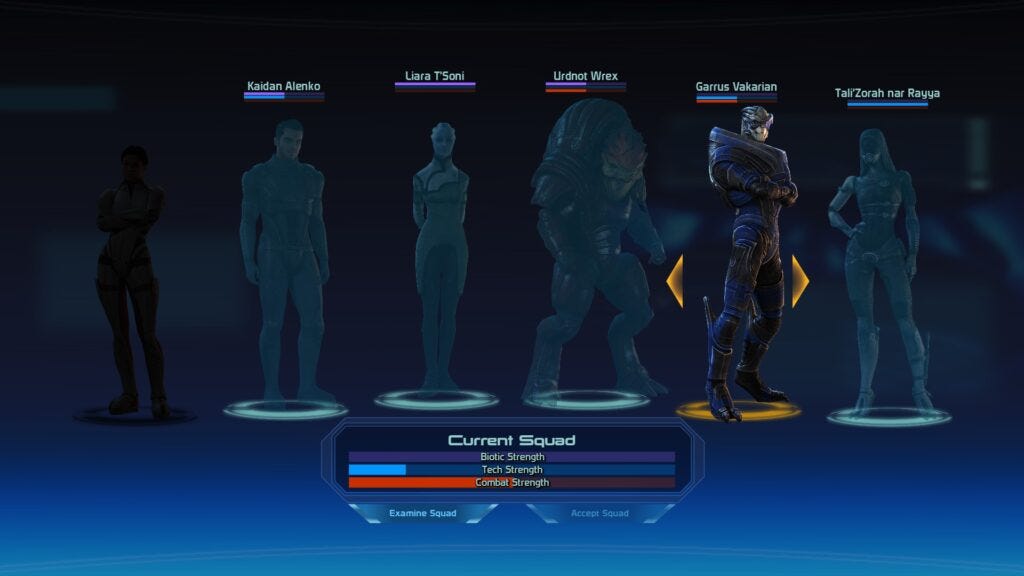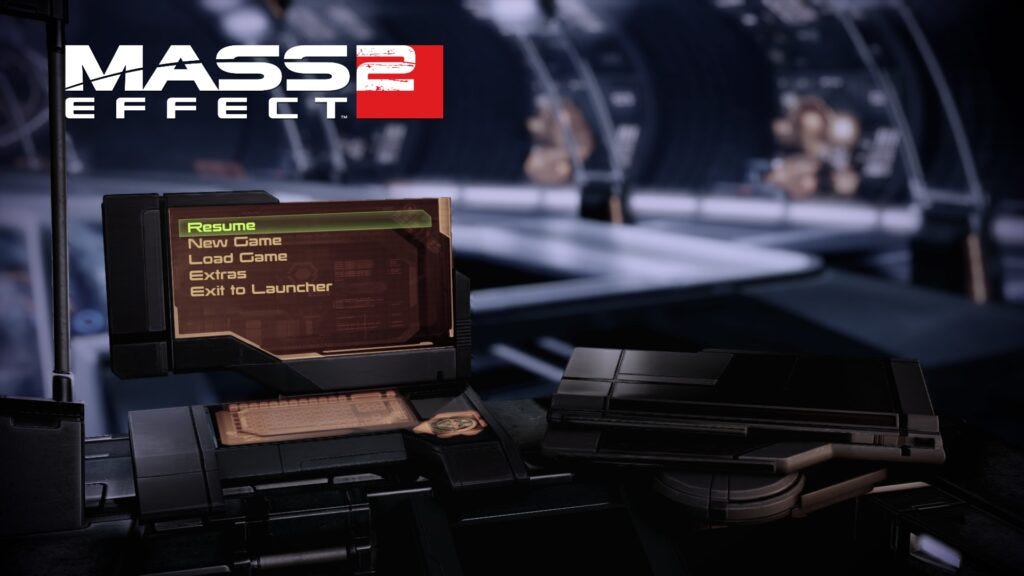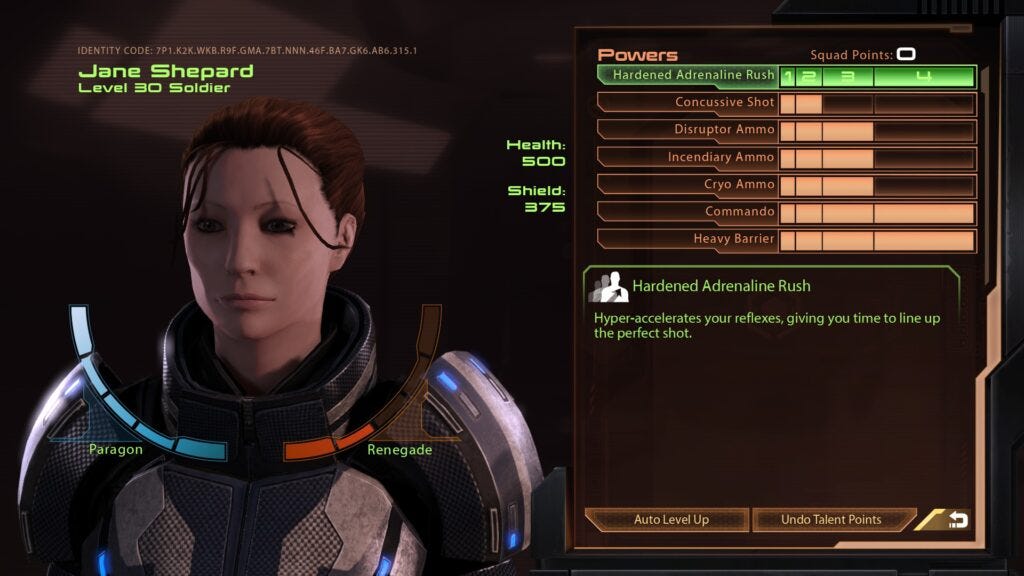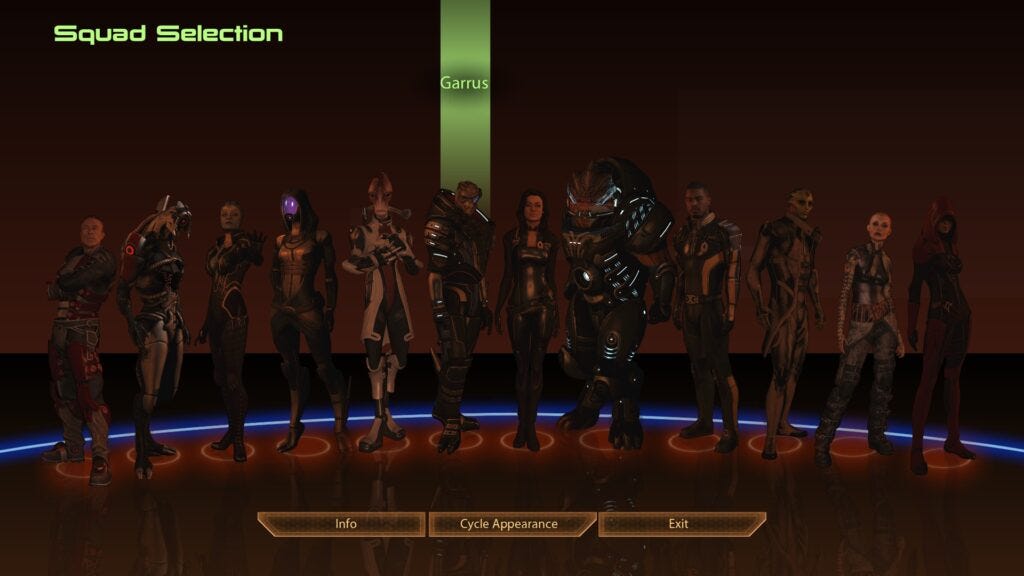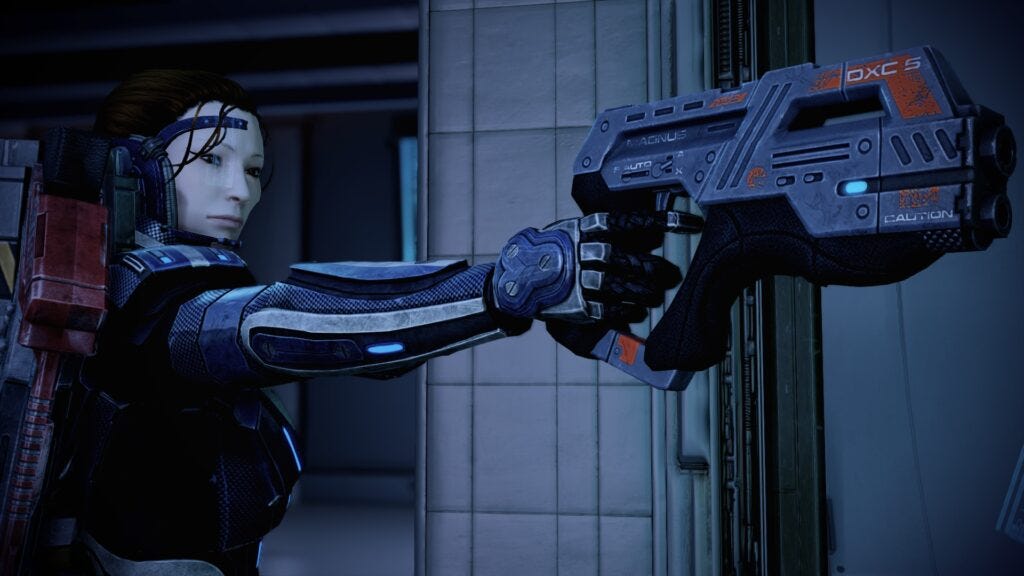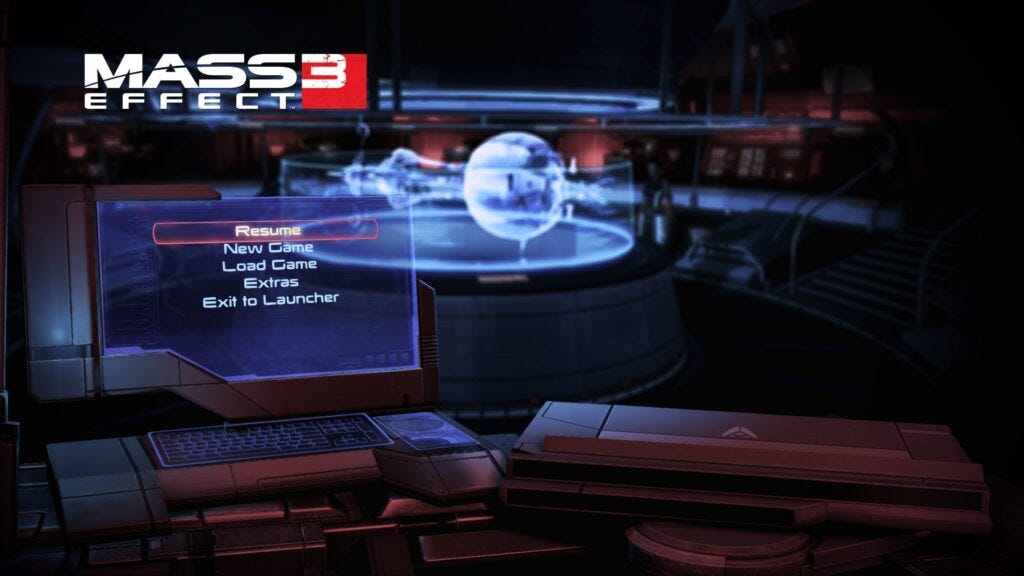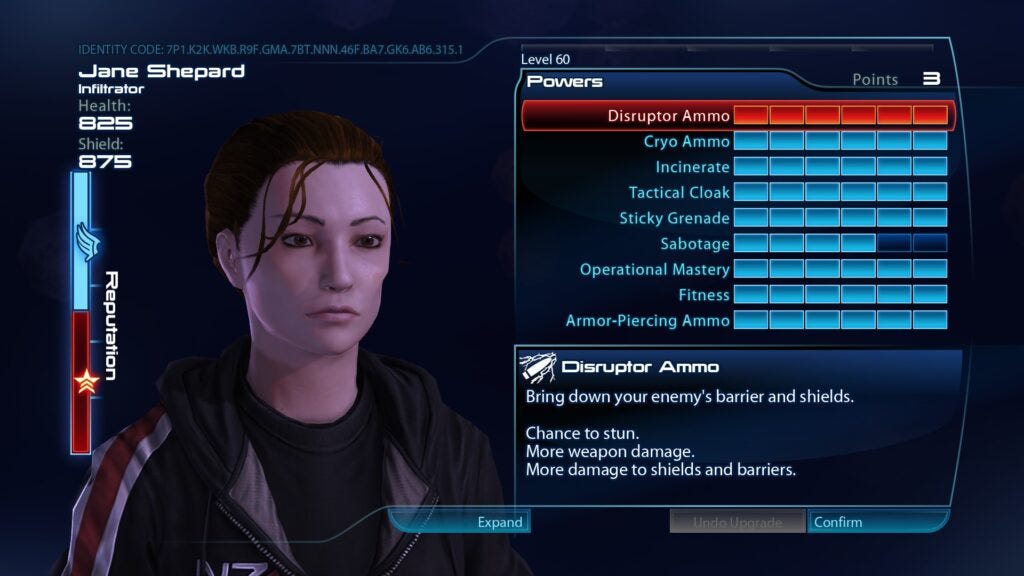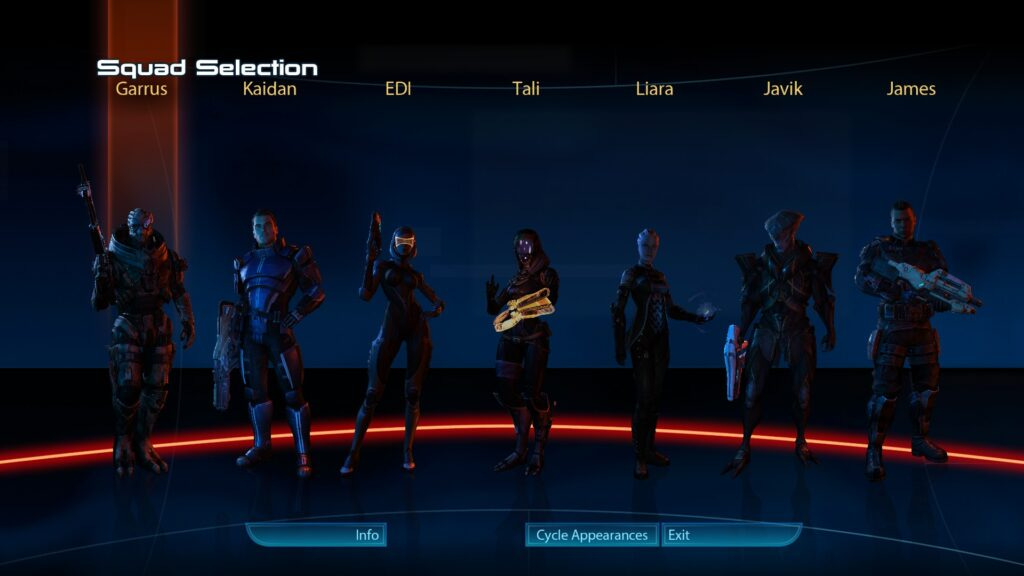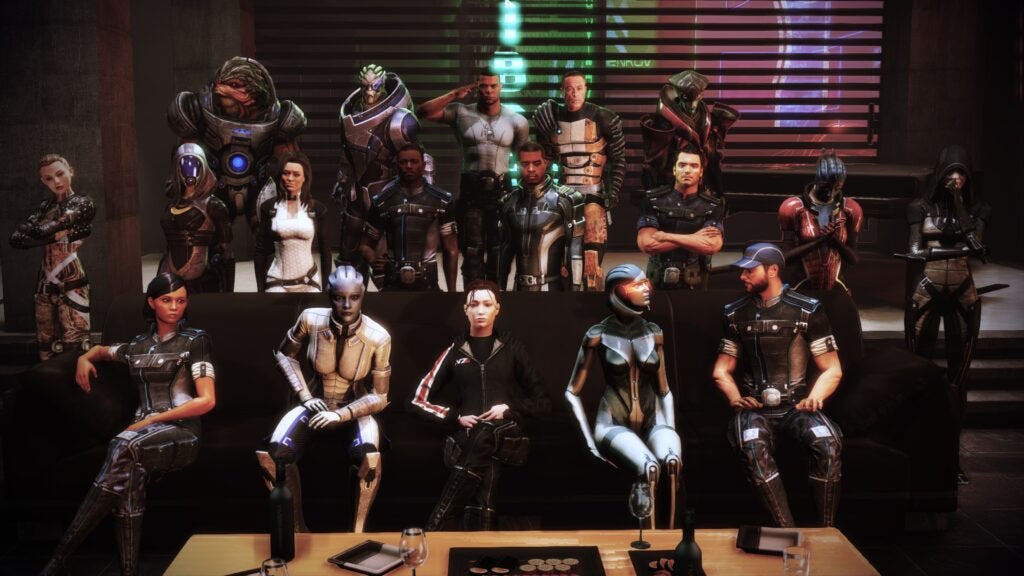On my twelfth birthday I saw a banner on Steam for a new RPG called Mass Effect 2. My brother had mentioned this game to me at a family dinner the previous night, and so going off his suggestion I convinced my father to buy it for me. This was to be the first cRPG I played through to completion on my own.
I thought it was the best game ever made. I must have finished it six times.
In the eleven years since, a number of other cRPGs have overshadowed that early-January experience: Dragon Age had better characters, Fallout had a better world, Knights of the Old Republic had better stories. Although I was no Mass Effect 3 hater, the series dwindled away in my memory, still recollected fondly at times but otherwise dismissed as 'that trilogy where the writers thought robo-Skeletor would be a good antagonist' and 'that pretty good series that received a horrible sequel where the player character is a horse.'
My intention was to replay the games at some point with a single Shepard, yet many years of murmurings of a remake or remaster dissuaded me from giving in to temptation. If a remaster were coming, I'd wait for it, and replay the series to completion then--for the best possible experience.
So May 14 2021 has come and gone, and at long last that remaster has arrived. It's called Mass Effect: Legendary Edition, which you probably knew already, and, quite legendarily, excludes the dumpsterfire that is Mass Effect: Andromeda.
After two weeks and 80.4 hours, I've completed all three Mass Effect games on Insanity and concluded my first playthrough of the series in well over five years. So: how do they hold up, and is it worth paying $60 for the Legendary Edition when you already own all three games in the same digital library as the one you're adding the LE to?
Here, I'd like to go through the games one-at-a-time and give my thoughts, then conclude with remarks about the LE itself. Wish me luck--there's a lot to say.
Mass Effect (2007)
The original Mass Effect is a good game. The setting is engaging and original; the stakes are high; the characters are decent; the story is mostly coherent. It is also in Mass Effect that the enhancements from the Legendary Edition shine through the most: the UI has been updated to reflect the latter two games, sniper sway has been removed, and the graphics look better than I remember.
Yet even with these myriad improvements, ME has one enormous problem. In fact enormous is an understatement. It is a singularity, a supermassive black hole at the center of the galaxy, that ruins the experience of revisiting this game and hangs over the player's neck like a guillotine's blade whenever he begins to enjoy himself.
That problem is called Mass Effect 2.
Literally everything good about Mass Effect is improved in the sequel. The writing and characters most importantly, but also the gameplay, the graphics, the art design, the music, the sound, the level design, the exploration mechanics, the inventory system...in short, everything.
What I must endeavor to do here, therefore, is place myself in 2007 and judge Mass Effect on its inherent virtues, rather than its shortcomings relative to its two sequels. Judging Mass Effect by 2's standards is like comparing every Orson Welles film to Citizen Kane, or every Leonardo painting to the Mona Lisa. It is a recipe for disappointment.
Meet Jane Shepard
I played a jowly, ponytailed, and square-jawed FemShep named Jane, whose face code I pulled years ago from an online site. As I recall she was supposed to be based on Olivia Wilde--the resemblance is loose, but I like the look, anyway. For class I chose Soldier, as I remembered every enemy in Mass Effect having regenerating shields, thus making both Tech and Biotic powers completely worthless. Soldier seemed the class least likely to be miserable.
This was correct.
Where I went wrong was in thinking that Mass Effect was a hard game. I beat it once, in 2010, and I recalled it being challenging throughout. This time, it wasn't. I more or less speedran the game in 14 hours, doing the main quest and a handful of the more interesting side objectives, and on Insanity difficult. The only combat encounter that required more than one attempt was the boss fight with Saren, in which my model kept glitching, forcing me to reload old saves.
No doubt anyone reading this will know of Mako matters and ME's horrible shitty vehicle exploration system. One of the touted improvements to the LE was improved Mako handling. I found myself switching between the two modes regularly; "improved handling" means, in reality, "mouse controlled steering." This is sometimes an improvement in linear driving sections, but is no better than the original keyboard controlled system when exploring or in combat. In short the new Mako controls are also bad, just for different reasons.
If it seems like I'm overconcerned with gameplay so far, it's because this is the area where, even despite improvements, the first game is so held back.
There are too many active abilities and too many different skill trees, none of which are actually trees in and of themselves (they don't branch). There are dozens of different types of weapons, all with marginally different stats, each with two slots for upgrades, but none of this customization matters beyond DPS. The same goes for armor. Mass Effect's inventory management system is conventional cRPG faire, and throughout the game you'll have to endlessly sift through loot looking for marginal upgrades, converting items into Omni-Gel, and selling everything else. If this wasn't bad enough to do for Shepard, you'll also need to babysit armor and weapon upgrades for everyone else on your crew.
I suggest not bothering with your squadmates' equipment, though, because they're all useless anyway. They'll spend most of their time shooting into walls or taking cover on the wrong sides of barricades. Unlike in later games there are significant delays between when you order them to use an ability and when that ability goes off, which in effect means there's no purpose in micromanaging their powers. Biotics will sometimes come in handy, but any companion in light armor--Garrus most notably--is good for nothing but dying instantly at the start of every fight. I liked Wrex the best, since he could at least draw enemy fire and tank some damage while walking into walls and doing nothing.
Not that it matters, mind you, because the game is still very, very easy.
The major point of controversy between the first and second Mass Effect games has always been the question of ammo. There is no ammo in Mass Effect. You manage heat instead. This was changed to a more conventional system in 2.
I like the idea that ammo is effectively infinite in the future, and I understand why fans are still up in arms over this change after 14 years. However, the gameplay implications of infinite ammo are significant, and I'm afraid having no ammo is what ruins everything about Mass Effect's gameplay.
First and foremost is the fact that guns feel wimpy when overheating is all that's on the line. This was always my complaint with the first game's combat as a kid: the weapons don't feel like real guns.
But far more important is that, when ammo is unlimited, there's never any reason to swap between guns, aside from situation. This means that if you buy a late-game rifle from the Spectre shop, you will literally never have to think about using your sniper, shotgun, or pistol ever again. The late-game assault rifle is effective at all ranges and has higher DPS than any other gun. Once I put my hands on it, I never used anything else except for the sniper rifle, and even then, only sparingly.
You could, if you prefer, beat the game using nothing but the sniper. I hardly used any other weapon in the first 50% myself.
The game's active abilities don't do anything to make the gameplay more interesting. As alluded toward earlier every enemy in this game has an energy shield, a bit like Halo (although you'll note that only literal Elite enemies in Halo have regenerating shields, because they're annoying to face in large numbers), and powers do not work against enemies with shields. This no doubt makes the Soldier the best class, since her DPS-modifying abilities do not do direct damage and therefore do not care about shield status, but renders everyone else redundant.
This, by the way, is to say nothing of how annoying it is when every enemy on the map regenerates HP faster than you do.
So, at the end of the day, Mass Effect is a cover-and-squad-based looter shooter with a powers focus wherein the cover shooting isn't fun or satisfying; where the squad is useless; where the looting is oppressive and pointless; and where most of the powers serve no purpose.
Would I be more inclined to tolerate all this if 2 and 3 hadn't had such vastly superior gameplay? I've thought long and hard about this, and the answer is probably yes. Still, there are huge problems in the first game's systems design, and they led me to spend the entirety of my purgatory playing through this game again thinking, "Man, I can't wait to get to 2."
But what about the narrative?
What strikes me about these games in retrospect is how they utilize player choice to construct narrative despite the fact that they are, overall, very linear, especially compared to Dragon Age. More on this will follow later, as it's one of the most important ways for us to understand what Mass Effect 3 is doing and whether or not it succeeds. For now...
Mass Effect is a good RPG. The dialogue sounds naturalistic, the pacing is functional, and there's just enough decision making for the player to feel like they are Commander Shepard--while also permitting her to feel like her own person.
It's the ludonarrative justification for Shepard that works best. There are tactical decisions you can make, but ultimately you're a soldier and you follow orders. Paragon and Renegade are microcosms of this fact. You can do things by the book or with your own loose cannon edge, but in either case Shepard will still do what Shepard does. She is much like Geralt in that sense.
I wrote in my Inquisition retrospective earlier this year some brief but damning comments about Shepard's lack of personality, and I'd formerly like to rescind those comments here. Jennifer Hale's Shepard does have personality and a consistent performance, and I feel confident in saying that she's by far the best voiced protagonist we've so far seen in a cRPG of this type--again, barring Geralt, who doesn't count.
There's only a spark of that personality in the first game of this trilogy. Shepard rarely, if ever, talks outside dialogue wheel action, a fact which changes significantly by 3 (where she's mostly talking for herself and you only pitch in sometimes). Mass Effect deserves a tremendous amount of credit for both pioneering this method of dialogue selection while also doing it well.
The story isn't bad, either. Saren is much more interesting than I remember: he works because he believes he's right. He has conviction in his evil, which gives the impression that he's a rational actor--and thus a real person. The narrative on display is coherent if not always amazing (unless I missed something, the revelation that Saren is breeding a krogan army comes about fifteen or so seconds before blowing up said krogan factory), which is, I'm afraid, not praise that can be leveled at the subsequent two games.
But there's one huge problem with Mass Effect's narrative: character.
First and foremost are companions, who are worse than in any other BioWare game (except maybe Dragon Age 2 and definitely Andromeda). This was what I remembered least fondly about the game, and I'm afraid I was right. Let's go down the list:
Ashley is a racist.
Kaidan is a dude.
Liara talks funny.
Wrex is a frogman.
Garrus is a sarcstic spacecop.
Tali is a whiner.
Wrex and Garrus are both fine. Everyone loves Garrus because he's snarky and fun to have around, but there's not much else there (beyond the fact that he's a loose cannon, which is better than nothing). I like Wrex, but he has nothing at all to his character beyond being "the krogan archetype." Ashley and Kaidan have nothing. I have nothing to say about them. They're boring beyond belief. Liara keeps filtrating with my Shepard in creepy and work-inappropriate ways, and beyond that is boring and talks funny. Finally there's Tali, who does nothing in the first two games except complain about the fact she was born a quarian. How endearing.
This is not a winning cast.
If the side characters were good that might make up for it, but they aren't. Besides Joker--by far the standout from the game, as well as the series--no one on the crew is interesting, except Chakwas. The Council are all terminally stupid and poorly conceived; if they didn't behave like idiots, the game would never need to happen. Udina is a psychopath and I can't stand his voice actor. Captain Anderson is Keith David, which is worth a lot, but doesn't have much else going for him.
...and that's basically it. A few NPCs here and there like Emily Wong stand out, but for the most part the game is desperately lacking in interesting personalities. This, beyond any other factor, is why the game is simply not fun for me to play.
Mass Effect 2 (2010)
Everyone loves this game already, and for good reason, so I'll try to keep my review brief. As a note, I did literally everything in my playthrough--complete 100%. It took 30ish hours.
Mass Effect 2 owes everything to depth. Although largely linear, like its predecessor, the probability space for each mission is immense. The designers hint at this probability space in small ways, such as through giving companions dialogue with each other when taken out on missions. Unlike Origins, in which similar conversations are mission agnostic, the dialogue in 2 (and later 3) is truly reactive to who is with you and what's happening on any given adventure. There must be dozens of permutations per mission.
This is the core strength Mass Effect 2. I was astonished at how many small choices from the first game were paid lipservice in 2. These choices did not make a difference on the overall trajectory of the narrative, but they were mentioned, and that was all the writers needed to do to make me feel important and to give my decisions a sense of weight.
The gameplay is enormously improved. 2 is a solid cover shooter. Powers now have a niche. Companions are no longer worthless, in part due to a removal of shields on most enemies and in part due to the removal of cast-delay.
The elimination of inventory mechanics and a refinement of the skill system makes a big difference. Weapons are now far fewer, distinctive in their utility, and upgraded through a more coherent and interesting metagame. The level design is far better, which, together with the previously mentioned improvements, mean that Mass Effect 2 is one of the only cRPGs ever made where the combat is actually enjoyable--although I still found it much too easy on Insanity.
All this hardly matters, though, since it's where narrative--pacing and characters especially--that 2 shines. I've never been partial toward the Reapers as a plot device and this is the only entry in the series where you're allowed to forget about them, at least sometimes, and instead focus on the strength of the worldbuilding. The build-your-team-up heist-angle toward the story isn't perfect, since you can only take two companions with you at any given time, but gives a solid impetus for the plot, and all culminates spectacularly in the Suicide Mission.
The cast of 2 is infinitely improved over its predecessor. These characters rock. With the exception of Kasumi and Zaeed, both of whom are annoying and poorly fleshed out, every single person in the screenshot above is more interesting and well-written than anyone in the first game. Jacob is a bit boring, Tali is too whiney, and Samara is kind of lame, but they're still solid and well-written. The rest? The rest are great. Loyalty missions were a brilliant way for the writers to better develop each companion, and tying loyalty into skills available as well as Suicide Mission survival was a stroke of ludonarrative genius. That is exactly the sort of thing narrative designers should be trying to do.
I'd be remiss not to mention now that my favorites have to be Jack, Mordin, Legion, and Miranda, all of whom are among BioWare's best NPCs. I regretted being FemShep come ME2 because I wanted to romance Jack very, very badly--she's so badass! Although, it must be said, it's hard to pass up Yvonne Strahovsky, too.
The Suicide Mission deserves further attention, because it's the best level of any BioWare game by a mile. It's one of the few places in RPG design where your decisions, rather than merely your choices, actually matter. Let me explain:
In the first game, the most important moment is whether or not Shepard can save Wrex. This ultimately comes down to: did you spec Ren/Par high enough, and did you select the Red/Blue button when we wanted you to?
This isn't an example of bad narrative design. Whether Wrex lives or dies is a memorable interaction, but it's also shallow. It comes down to a skill check, effectively.
Compare this to the Suicide Mission. EVERYONE can die, including you, if you play your cards poorly. A significant number of these deaths depend on whether or not you've properly prepared: when Garrus is killed by a blast from the Collector Ship, it's YOUR fault for failing to upgrade the Normandy's armor. Conversely, when everyone lands safely, it's YOUR action that got them there. You made these decisions without knowing the consequences, you weighed these decisions against the cost of other improvements (like weapons and new armor), and in the end it pays off.
This same thread continues throughout the mission. Whether or not your team survives come down to you making the right decisions in the moment, like a leader does. Jack only surviving if her loyalty mission has been completed isn't just you choosing to click the "not loyal" box; it's the extension of your decision as a player NOT to pursue the mission she gave you, and the direct consequence thereof. That is fucking awesome. Moreover, the Suicide Mission is the only time in any of these games where you see everyone working together, which is both satisfying and rewarding.
All this together is fabulous narrative design, and that is why 2 is so fun to play, over and over and over again. Good narrative design is what makes a decent game spectacular. Every system coheres logically and reinforces the story. That is what Mass Effect 2 does better than any other RPG.
Coming off the heels of Dragon Age: Origins and Inquisition, another element to the trilogy's presentation that stood out significantly was the quality of the cutscenes. Characters often interact with each other, move around the environment, and act like real people during conversations. This is not the case for most other RPGs, where conversations are usually two people holding creepy eye contact with each other until the player decides to awkwardly walk away. This sense of cinema makes the dialogue throughout the trilogy much more engaging than the talking heads of Origins ever manage to be.
Is anything about Mass Effect 2 NOT good?
There are some issues, however small.
Is it even worth discussing how stupid the Human Reaper? I still don't know what that is, and it's never once alluded toward earlier in the game. I also found it at first amusing, then frustrating, how every mission is driven by coincidence, with Shepard arriving at just the wrong time to find herself in combat with random mercenaries.
Above all else I dislike how rigid the game's mission structure is in practice. The pacing of the missions is solid, but there's always a 1:1 ration between "problem solved" and "missions done." Recruiting a new companion, for example, never takes more than one mission. Earning loyalty? One mission, and one mission exactly. Investigating Harvest? One mission. Reaper IFF? One mission!
This is a tiny nitpick, I know, but 3 does a better job with varying this predictable formula.
My only other criticism of Mass Effect 2 is that there are too many companions. It's depth that makes so much of this game work, but, ironically, the deep and well-written characters on the cast are simply not given enough time to pay themselves off. I'd have rather seen a game without Samara, Kasumi and Zaeed (yes I know they're DLC, leaving that aside), and Jacob, where instead Jack, Miranda, Legion, Grunt, Mordin, and Tali each have two loyalty missions instead of one. That, I think, would have made 2 perfect.
So Mass Effect 2 is the best cRPG ever made, then?
Taken as a complete package, ME2 is undoubtedly the best game in its own series. It is one of the best games ever made, and it's one of the only cRPGs that succeeds ludonarratively. It is no coincidence that fans continue to hold it on a pedestal. No game deserves its following more.
But here's the thing. I still like Origins more.
Why, when I spent so many words complaining about its terrible systems design and its countless narrative flaws? When Mass Effect 2 is demonstrably superior in every aspect of design, and is far more fun to replay?
At the end of the day, I suppose I prefer the relative lack of constraint in Origins. I like the characters more and find they have more depth, and each narrative choice (not decision) seems more significant overall. I find Origins tells a better story, and it gives its characters arcs in a way that none of the Mass Effect games manage to.
But that's just my own take. In all seriousness, I'd expect nine out of every ten people to prefer ME2, and there's nothing wrong with that.
Mass Effect 3 (2012)
Those of us who can remember Mass Effect 3's release will no doubt also remember the enormous shitstorm surrounding its ending. I recall hearing about it on the corporate news my mother was listening to, after having pretended to be sick to stay home from school and nolife through the game before I was spoiled.
My thoughts at the time were that yes, the ending sucked, but the overall game was well worth the experience. I thought 3 was still excellent.
Over time the line against 3 hardened. A lot of people do not like it. I've never understood why, but then again I hadn't replayed it since c. 2016. Is it worse than I remembered? Had I missed something as a kid?
Actually, no.
Mass Effect 3 is the most deeply flawed game in the trilogy and it might also be my favorite. I feel about it much the same way I do about the film Joker, or the first season of Westworld: so long as you can ignore the fact that nothing makes any sense whatsoever, the story, characters, and plot are fantastic. It's just the overall logic that's lacking.
Sometimes a lack of overall logic is terminal, but when the constituent parts are brilliant enough, the whole can be worth at least as much as the sum of those parts. Let me use this opportunity to explain why ME3 works so well. Like with 2, I did everything in this last playthrough. It took me me 31 hours. No stone was left unturned and no planet unscanned.
The Game
You might notice that I transitioned into Infiltrator at the begging of 3. This is because the idiotic restrictions on weapons were removed, and I recalled Infiltrator being the best--and most fun--class.
I was correct.
The gameplay improvements between 2 and 3 are similar in size to those between 1 and 2, although less in terms of design principles was changed. I will boldly proclaim now that Mass Effect 3 is the best cover shooter ever made, by a significant margin. It has far and away the best gunplay of any cRPG, and its action sequences make games like Dragon Age: Origins or Knights of the Old Republic look like pong.
Weapons are responsive. Powers are useful and viable. The balance is good, with the best system of weapon customization in the series. The elimination of Heavy Weapons is a step in the right direction and the final tuning of the skill system, wherein actual branching trees are included for each power or passive ability, allows the player to forge his own Shepard's path and gives desperately needed depth to the series' progression systems.
Changes to Paragon and Renegade rules make playing neutral Shepard, as you can see above, viable in a way that it is not in the first two games. This is because total reputation is all that matters; you do not need Good Guy points to choose the Good Guy dialogue prompts, you can have either. This change is enormous for those of us who sometimes do the Red Thing and sometimes do the Blue Thing, because we're not psychopaths and have a capacity to reason and reach independent conclusions. I wish this was backported into 1 and 2. It's a huge improvement.
Hacking minigames have been removed entirely. There are no shitty vehicle sections. Whereas 1 and 2 both have numerous horrible shitty boss fights, especially 1, 3's handful are unobtrusive and only moderately horrible and/or shitty. In fact the only thing to dislike about Mass Effect 3's system design is that there's way too much screenshake at the end of the game. That's the only criticism I have.
The Narrative
Mass Effect is a trilogy and was a trilogy from the outset. It is therefore written like a trilogy--a quality no other major cRPG series shares (except The Witcher, maybe, but those games do not tell a single story). Consequently I had it on my mind as I played through that, all things considered, ME's narrative is a railroad. 3 is the worst offender in this regard. Why is Admiral Anderson an admiral? I made him councilor, didn't I? And why does Cerberus always go (more) evil? And how come nobody cares anymore that I let the Council die? All three of these things seems pretty important!
Some courses have to be pre-scripted. Games such as the good Dragon Ages are written as standalones, which permits a wider range of actions. In Mass Effect you never have more than two options to resolve a problem, and most of the time either option proves more or less the same one game later.
Despite these apparent flaws, Mass Effect 3 has tremendous narrative design.
Literally any companion from 2 can die in the Suicide Mission, and the writers had to stay true to this reality. That means every time an old face shows up in 3, there's a chance he could've been someone else. They could have balked at the challenge and invented dozens of new characters to fill the gaps. Instead, they went all-in. In fact it's a little bit absurd how anyone who's had a tenure on the Normandy has ended up in a position of power somewhere, doing something. Tali is an admiral. Garrus is a consulting general. Legion is still repping the Good Geth Guys. Etc.
Yes, this is a tad silly, but they narrative designers are respecting player agency by including these characters in every main arc of the plot. And if those characters are dead, the content is radically different.
Maybe not 'radically.' As best I can tell the same events always take place. Still, the presentation changes, and a not-insignificant amount of writing and voice recording has gone in to that change.
I've never liked that Miranda and Jack can't be brought back as companions, Miranda especially since she's not doing anything else. We could spend all day criticizing BioWare for not going far enough. Instead, I'd like to applaud them for instead having two entire companions--Tali and Garrus--who can simply be dead and not-at-all present. Both of these characters factor significantly into the plot and DO NOT come across as no-line baggage elsewhere in the game, like at the end or when brought along on missions. The same goes for Kaidan, who, despite being an obnoxious shithead who I hate, could very easily be Ashley instead (a whiney shithead who I hate even worse), and therefore an entirely different character.
Yes, not that much actually changes between Kaidan and Ashley, like for example they're both still obnoxious and whiney shitheads, but there's an emotional impact to this superficial character swap that does matter. Remember: agency is not the state of having your choices matter. It is the illusion that your choices matter, because all games are finite and your choices never do, actually, make a difference. At this I think ME3 is enormously successful.
3 stumbles with its characters worse than 2 but less than 1. Tali, for the first time, is a decent character. She no longer spends all game whining about being stuck in her suit and gets shit done instead. Liara is less annoying, although I'm still not sure what there is to her character aside from 'I talk funny.' Kaidan, alas, is a waste of space, and I wish I could've left his ass in that factory alongside Ashley. Garrus is great. EDI is all right (she has Overload, which is the only thing that matters), but I prefer her on the ship to off it. Javik and James are fine for what they are. They aren't loathable like Ashley/Kaidan, but they're also not very exciting.
The game is desperate for a Miranda or a Jack to spice things up. Alas, we have to accept these characters as questgivers and little else.
But as questgivers, they're great. In fact, despite the companion cast being at best decent, the game's cast at large is phenomenal. There are shiploads of great, memorable characters, including Joker, a spiced-up Anderson, Hackett (who, by the way, always believes Shepard when she tells him the truth--amazing how much that endears the player to a character!). Miranda, Jack, Wrex, Mordin, Aria, the Illusive Man, shipboard EDI...and their roles are not token. They factor considerably into the story. Compare this to Kaidan's cameo in 2, which is nothing more than that--a brief cameo that doesn't matter at all and serves no purpose in the narrative.
This is an impressive accomplishment. It's impressive that they even tried, and it's amazing that they did such a great job. Writing Mass Effect 3 must have been one of the most difficult challenges of narrative design in the history of the medium. It fails where 2 succeeds because 2 basically needed to do nothing; as the second act of the story, it could take its time, go wherever it wanted, skip ahead two years, and work in whatever it wanted from the first game--and nothing more than that. 3 did not have that luxury. 3 had to hit every beat required to tell a full story. It had to wrap up every loose thread. At the end of the day, BioWare did not do a perfect job. There are some rough gaps between the missions and things don't always make sense. Still, they did a pretty damn good job.
One element of 3's presentation that I do think works is the development of Shepherd herself. There are far fewer dialogue wheel options and she speaks often in conversation without your input. This trend begins in 2 and is taken to its logical conclusion in 3: by 3 Shepard has become her own character. She feels like a real person and not a black hole RPG protagonist. This, in turn, lends weight to the relationships forged between you (the player) and the cast, because you can understand what Garrus and Jacob and Miranda see in your character as a person. I don't understand what Ashley sees in Shepard in the first game, and I've never understood what anyone would see in the Hero of Fereldan or Hawke.
It does bear mentioning that the game's first act is terrible from a narrative standpoint. Setting a number of variables to 0 for the initiation of the trilogy's finale is jarring, full of coincidences, and poorly paced. I did not enjoy anything until the map opens up, at which point the game becomes so much better.
Then, of course, there's the end.
The End
How do you end a trilogy like Mass Effect?
I have no fucking clue.
In retrospect, the finale should have been linear, and based off nothing except the player's Galactic Readiness rating. This would have been criticized as being a railroad, but they could have worked to make that linear finale shine and no one would have been able to complain about the trilogy's final moments being...a lightshow.
I'm not a sycophant for BioWare, although I do sleep with Drew Karpyshyn and David Gaider dolls in my bed at night, and I'm not here to defend 3's ending. The final battle on Earth rocks, but the actual finale makes no sense. The Starchild? What? There's a magic button the Reapers can press to make this problem go away? Why haven't they pressed it? Because the galaxy wasn't ready? Huh? And what does Synthesis even mean? How the hell do you merge the DNA of organics with that of synthetics? Like, literally, what does that mean? Synthetics don't even have DNA! And why did the Reapers hire a shitty ten-year-old child actor to be their avatar? What?
The Deus Ex Games have similarly received denigration for having endings in which the player pulls one of three different levers, then gets a final cutscene. This is not the way to write good RPGs. But you have to take 3 in context. I wish the ending was better, but I recognize the immense conundrum the narrative designers must have found themselves locked within. And I'm sorry to say that I don't think a bad final five minutes ruins thirty hours of (mostly) excellent systems and narrative design. The journey matters so much more than the destination in a game like this.
The criticism which does seem fair to level is that Galactic Readiness does not matter nearly enough. It should be possible to lose, or at least for everyone to die, if Readiness is too low--just as how you can 'lose' and have everyone die in 2 if you fail to do enough loyalty missions. Instead, as far as I can tell, it changes nothing. The only major difference is that Shepard will survive with a Destroy ending if GR is high enough. I 100%ed the game and had 7k War Assets, but apparently that wasn't 'high enough' and my Shepard still died.
This frustrated me more than any Starchild bullshit ever could have.
The Final Goodybe
I saved the "Citadel" DLC for last, since I remembered it being a final homage to the series and its characters. I also remembered it being ridiculously silly and full of fan service. I was right on both counts, and I loved it.
For all the series' flaws, these games are very special. Even where 3 stumbles it has immense heart. "Citadel" is the send-off from the writers to us, and seeing every living companion gather together for the house party at the end is every ounce as satisfying as it was intended to be. Moments like that have to be earned, and BioWare earned it.
If you're someone who hated 3 for its ending in 2012, I implore you to play the trilogy again, start to finish, and I dare you to say that Citadel isn't a better send-off for this series than any other game has ever received. 3 isn't perfect, but BioWare cared about the setting, they cared about their characters, and they did their best. Above all, they cared about the people who loved their games; and in a post-Andormeda world, I'll take that wherever I can find it.
Playing Mass Effect over again reminded me of how important these games were to me when I was young. I don't much like 1 and I think 3 has major issues, and yet still my first inclination after finishing the series last night is to go back and do it all over again as a MaleShep. I know every inch of these games by this point and that still doesn't matter. Between obviously immense production value and an excellent team of designers, I struggle to think of any trilogy--within or without gaming, although perhaps barring novels--that is so compelling overall.
Mass Effect is a special series. We'll be lucky if anything of this level of quality is ever made again. If you haven't played it before, change that now. If you have played it before, play it again anyway. You won't regret it.
The Legendary Edition
Some degree of internet bitching has taken place over the last few weeks concerning the fact that the PC port of the LE is bad. What these internet bitches have forgotten is that it's the exact same PC versions we used to have; that is to say, bad, with no major changes. I don't understand why anyone expected the ports to improve. I didn't, and I wasn't disappointed.
Beyond the first game the changes are mostly graphical and mostly minor. 2 looked better than I remembered in places, but overall I didn't notice the changes. The only technical problems of note were regular FPS drops in 3, which resolved themselves about halfway through the game. Is this much worth $60 if you already own all three games? You'd have to reference a side-by-side comparison to be certain.
For my part, I'm going to go out on a limb and endorse the LE. It's a new and improved way to play some of the best games ever made. Even if those improvements are minor, reliving the Mass Effect trilogy is worth far more than the price of admission.
Now, if you'll excuse me, I'm going to go figure out some way to make a MaleShep who looks good for my next playthrough.


